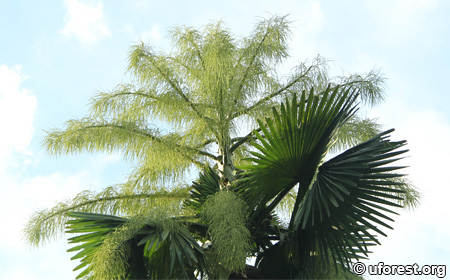| Etymology | Genus | From Greek koryphe (summit, top), referring to the giant terminal growth of this palm |
|---|---|---|
| Species | Shade-bearing; likely referring to the umbrella shape of the inflorescence | |
| Family | Arecaceae | |
| Synonyms | Bessia sanguinolenta Raf., Corypha guineensis L. | |
| Common Names | Talipot Palm | |
| Status | Exotic: Cultivated Only | |
| Form | Single stem palm | |
| Native Distribution | India, Sri Lanka, Myanmar, Thailand | |
Diagnostics:
Corypha umbraculifera is a tall single stem palm, and the largest fan palm, growing up to 25m (Ohn Set, 2005). It has huge fan-shaped leaves of up to 5m. It flowers and fruits only once in its lifetime before dying, and it takes up to 30-80 years to achieve that.
Interesting Facts:
There are 3 record holders for the largest flower in the world, namely the Rafflesia arnoldii as the largest single flower, Amorphophallus titanum as the largest unbranched inflorescence, and this, the Talipot Palm as the largest branched inflorescence. It can reach up to 8m long, carrying over 24 million flowers (Merklinger, 2017).
The tough and flexible young leaves from the palm, just like the Palmyra Palm are used as paper since ancient times (Ohn Set, 2005). Many original Buddhist scriptures were said to be written on the leaves of the Talipot Palm.

Magnificent flowering of Talipot Palm in Singapore Botanic Gardens (Dec 2012)

Fan-shaped frond.

Close-up of the inflorescence.

Fruits.

Close-up of the unripe fruits (May 2013)
References
Merklinger FF, Loo AHB, Ang WF, Khoon MW, Baker WJ (2017) A Guide to Exotic Palms of Singapore. Singapore Science Centre, Singapore. 170 pp.
Ohn Set (2005) Flowering Talipot Palms at Singapore Botanic Gardens. Gardenwise, 24: 22-23.
Author: Siyang
Posted: 2018-12-16 / Modified: 2019-08-27